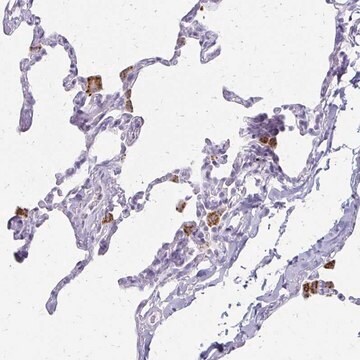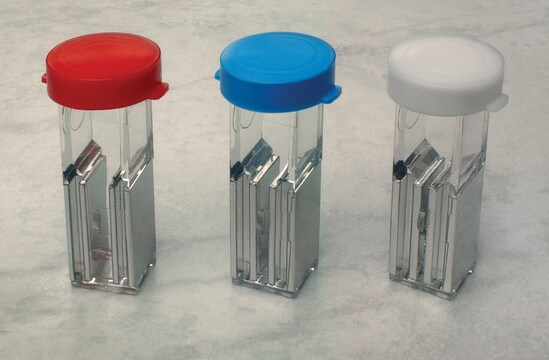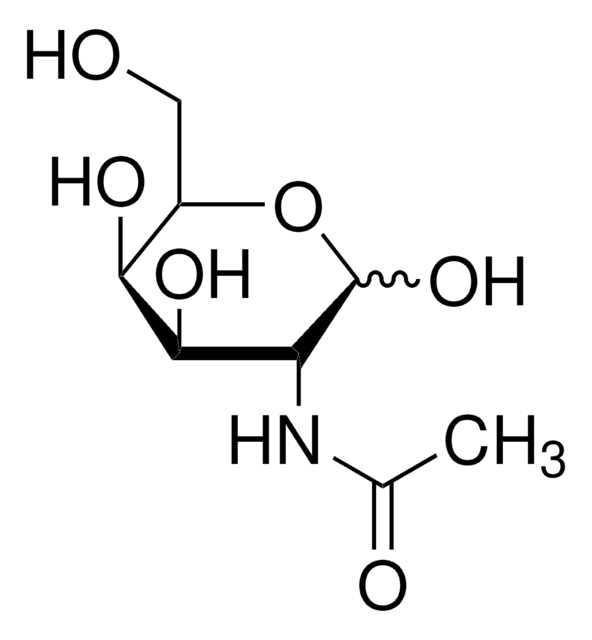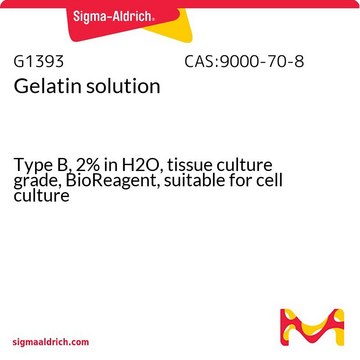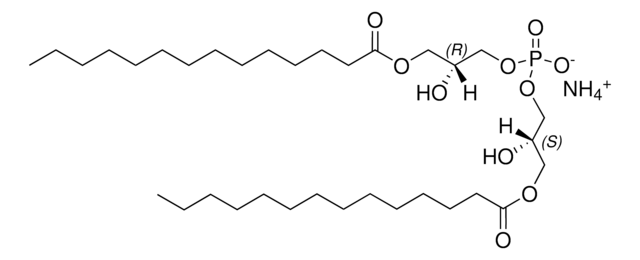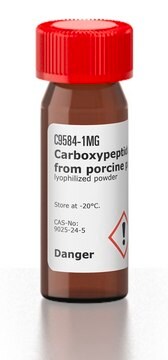推荐产品
生物源
goat
品質等級
共軛
unconjugated
抗體表格
affinity isolated antibody
抗體產品種類
primary antibodies
無性繁殖
polyclonal
形狀
lyophilized powder
物種活性
mouse
技術
immunohistochemistry: 5-15 μg/mL
neutralization: suitable
western blot: 0.1-0.2 μg/mL
UniProt登錄號
儲存溫度
−20°C
目標翻譯後修改
unmodified
基因資訊
mouse ... Tnfrsf11b(18383)
一般說明
Osteoprotegerin (OPG) secreted by osteoblasts and osteogenis stromal stem cells belongs to the TNF receptor superfamily. OPG is expressed in bone marrow, osteoblasts, heart, lung, kidney, thymus, B lymphocytes, chondrocytes and smooth muscle cells. The ratio of OPG and receptor activator of NF-κB Ligand (RANKL) is crucial determining the bone mass. Receptor activator of NF-κB (RANK)/RANKL/OPG axis decides the bone biology. OPG binds RANKL and prevents the activation of osteoclasts, the cells that deplete bone mass. Excess levels of OPG lead to osteopetrosis while deficiency results in osteoporosis. The RANK/RANKL/OPG pathway mediates the activation of multiple pathways such as NF-κB, Akt, JNK, and MAPK
Anti-osteoprotegerin specifically reacts with recombinant mouse OPG. The antibody may cross react with human OPG (25% homology).
Anti-osteoprotegerin specifically reacts with recombinant mouse OPG. The antibody may cross react with human OPG (25% homology).
特異性
The antibody has the ability to neutralize the biological activity of recombinant mouse OPG.
免疫原
purified recombinant mouse osteoprotegerin expressed in mouse NSO cells.
應用
Anti-osteoprotegerin antibody may be used to neutralize mouse OPG at neutralization dose (ND50) of 0.5-2 μg/ml. The antibody is suitable for immunoblotting at a working concentration of 0.1-0.2 μg/ml.
外觀
Lyophilized from a 0.2 μm filtered solution in phosphate buffered saline containing carbohydrates.
免責聲明
Unless otherwise stated in our catalog or other company documentation accompanying the product(s), our products are intended for research use only and are not to be used for any other purpose, which includes but is not limited to, unauthorized commercial uses, in vitro diagnostic uses, ex vivo or in vivo therapeutic uses or any type of consumption or application to humans or animals.
未找到合适的产品?
试试我们的产品选型工具.
儲存類別代碼
11 - Combustible Solids
水污染物質分類(WGK)
WGK 1
閃點(°F)
Not applicable
閃點(°C)
Not applicable
個人防護裝備
Eyeshields, Gloves, type N95 (US)
Brendan F Boyce et al.
Current osteoporosis reports, 5(3), 98-104 (2007-10-11)
Understanding of osteoclast formation and activation has advanced considerably since the discovery of the RANKL/RANK/OPG system in the mid 1990s. Osteoblasts and stromal stem cells express receptor activator of NF-jB ligand (RANKL), which binds to its receptor, RANK, on the
Anne-Priscille Trouvin et al.
Clinical interventions in aging, 5, 345-354 (2011-01-14)
Bone remodeling requires a precise balance between resorption and formation. It is a complex process that involves numerous factors: hormones, growth factors, vitamins, and cytokines, and notably osteoprotegerin (OPG) and receptor activator for nuclear factor-κB (RANK) ligand. The signaling pathway
Shabber Syed et al.
Journal of cardiovascular development and disease, 9(8) (2022-08-26)
Calcific aortic valve disease (CAVD) is a common cardiac defect, particularly in the aging population. While several risk factors, such as bi-leaflet valve structure and old age, have been identified in CAVD pathogenesis, molecular mechanisms resulting in this condition are
I Silva et al.
Acta reumatologica portuguesa, 36(3), 209-218 (2011-11-25)
The discovery of the receptor activator of nuclear factor-kB (RANK)/RANK Ligand (RANKL)/osteoprotegerin (OPG) pathway contributed to the understanding of how bone formation and resorption were processed and regulated. RANKL and OPG are members of the tumor necrosis factor (TNF) and
W C Dougall et al.
Genes & development, 13(18), 2412-2424 (1999-09-29)
The physiological role of the TNF receptor (TNFR) family member, RANK, was investigated by generating RANK-deficient mice. RANK(-/-) mice were characterized by profound osteopetrosis resulting from an apparent block in osteoclast differentiation. RANK expression was not required for the commitment
我们的科学家团队拥有各种研究领域经验,包括生命科学、材料科学、化学合成、色谱、分析及许多其他领域.
联系技术服务部门
